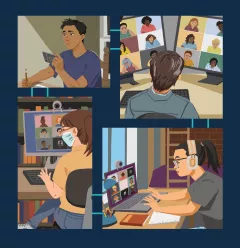
Research Sprint Recap: International Program on Digital Ethics Explores COVID-19 and Education
Global student program offers insight and recommendations for policymakers
A virtual program hosted by the Berkman Klein Center for Internet & Society convened nearly 40 student participants from 21 countries spread over five continents to explore the digital transformation of education in a time of crisis. Held over three months, this research sprint convened Berkman Klein staff, subject matter experts, and students.
Together, they engaged in dialogue and studied facets of COVID-19 and education, including infrastructure, equity, connectivity, and the future of education. The program was hosted as part of the Ethics of Digitalization project led by the Alexander von Humboldt Institute for Internet and Society (HIIG), the Berkman Klein Center, and the Digital Asia Hub, and in collaboration with the Global Network of Internet & Society Centers (NoC).
Outcomes and key takeaways from the program are outlined below. Following this successful program, the Digital Asia Hub in collaboration with the Berkman Klein Center will conduct a second research sprint on digital self-determination and digital sovereignty in mid-March 2021. The call for participants for that sprint will be announced soon.
Report for Policymakers Offers Points of Consideration
During the three-month program, students conducted research and engaged in debate to develop “Digital Ethics in Times of Crisis: COVID-19 and Access to Education and Learning Spaces,” a map of the critical issues and questions that policymakers around the world need to address surrounding COVID-19 and education and learning.
Research Sprint participant Benedict Long said of the report, “I hope that every decision maker that is looking at the outputs and the outcomes of our Research Sprint will find it helpful for them so they can translate the findings that we had and the discussions that we had into their specific context, to make change in the area where they are involved in and to actually make use of the power they have within their organizations, within their classrooms, and within their cultures.” [Watch Long’s full reflection here]
Some of the cross-cutting themes that the report explores include inequities in access and skills to use digital technologies; privacy, surveillance, and safety concerns related to education and learning; and the importance of cultivating learners' social and emotional development and well-being. One student group, for example, created recommendations for key ethical, human rights, and societal aspects of digital transformation, with an emphasis on education and learning.
Research Associate Alexa Hasse highlighted this final point about well-being during a final event for the program. “Across the sprint one theme that particularly stood out to me was the impact COVID may have on learner's well-being,” she said. “Particularly, given that for many of us COVID has impacted so many facets of our day-to-day lives. It may be helpful to think about well-being in a way that spans beyond just physical or mental health to include, for instance, learning experiences, living conditions and social interactions. And in terms of learning experiences during the Sprint, we talked about how schools serve not only educational functions but also provide environments and services that can promote well-being, which may range from meeting basic needs like food through school lunches or providing a rich social and emotional learning opportunities.” [Watch Hasse’s full remarks here]
Also in attendance was Armando Guio Espanol, an affiliate of the Berkman Klein Center and consultant for the Development Bank of Latin America. Guio Espanol spoke about the importance of developing policies to address issues in education and EdTech and the value of outputs like the publication from the Sprint participants, which informed his work with the Colombian government. [Watch Guio Espanol’s full remarks here]
Global Perspectives on Critical Issues
As the Research Sprint progressed, student participants, experts, and staff discussed issues facing students today amidst a pandemic and what it means for the future. Sabelo Mhlambi, an affiliate of the Berkman Klein Center, highlighted the importance of looking at a range of issues -- such as Internet access and digital skills -- and how they span across continents.
“I was definitely glad to participate and to hear similar inputs from other students, seeing that not only there are problems there in Sub-Saharan Africa and we see them as well in South Asia as well,” he said. “We see them all over the world and that we can find some commonalities in how we actually emphasize learning and equity and making sure that everyone has a chance to thrive within the education system, but also to truly feel as if they belong and to really improve their well-being.” [Watch Mhlambi’s full remarks here]
Reflecting on the experience, Research Sprint session lead and Berkman Klein affiliate Samantha-Kaye Johnston said, “Throughout the sprint process, a quote from Martin Luther King Jr. just really resonated with me. And that quote was -- or it rather is -- "Our lives begin to end the day we become silent about things that matter." And I'm sure that we can all agree that throughout this entire Sprint process, we really through healthy debate and within the context of COVID and education, as we've been all speaking about. We really dissected topics that matter.” [Watch Johnston’s full remarks here]
In addition to cross-cultural debate, students also benefited from building relationships across the globe. Research Sprint participant Elora Fernandes said, “In addition to all the lessons I learned academically and professionally, what most impressed me about the research sprint was the possibility of being in contact with people so different [from each other and] from different parts of the world. This opened my mind to several issues that were not my focus before and made me realize that the excellence of research is mainly the participation of people as engaged as those I had contact with.” [Watch Fernandes’s full reflection here]
Building a Network
Leveraging the spirit of and collaboration with the Network of Centers (NoC), the program fostered a sense of global community and connectedness. The program hosted interdisciplinary meetings and sessions with experts including: Santiago Amador, Jane Bailey, Veronica Barassi, Daniel Bell, Annabell Bils, Beatriz Botero, Carolina Botero, Lionel Brossi, Ana Castillo, Armando Guio Espanol, Muriam Fancy, Julio Gaitan, Jennifer Hanley, Katelynne Herchack, Velislava Hillman, Malavika Jayaram, Samantha-Kaye Johnston, Piers Kreps, Tom Lehmann, David Li, Andres Lombana-Bermudez, Danielle Lussier, Florian Martin-Bariteau, Anthony W. Marx, Sabelo Mhlambi, Diego Molano, Leah Plunkett, Justin Reich, Nagla Rizk, Marie-Claude Sawerschel, Eric Schilling, Jeff Young, and Xinran Yuan.
The spirit of global connection was evident at an internal showcase that highlighted major themes of the program, including connectivity, context, well-being, and key learnings for the future.
Research Sprint participant Sidharth Chauhan LL.M. ‘21 said, “It has been a great experience to be a part of a global cohort, hearing about experiences of people from different walks of life -- people from different backgrounds, people from various countries added perspectives, and i have honestly learned a lot from them. I have created everlasting bonds with other participants and my team, which I’m going to cherish for a lifetime.” [Watch Chauhan’s full reflection here]
The Ethics of Digitalization is supported by the German Federal President as patron and Stiftung Mercator.
